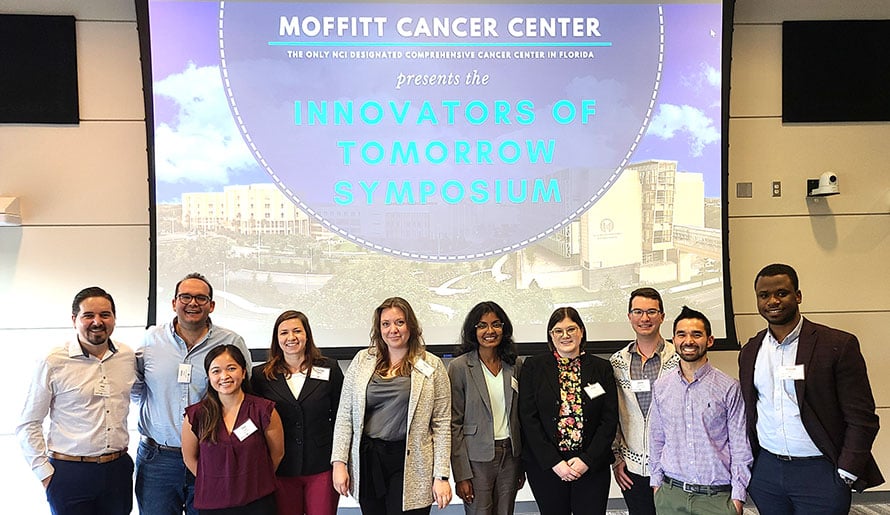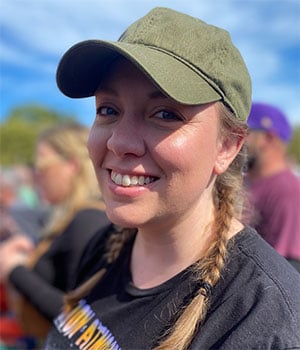Moffitt Innovators of Tomorrow Symposium Welcomes Its First Recruited Postdoc, Dr. Hayley du Bois

Research Education & Training is excited to welcome Dr. Haley du Bois back to campus as a new postdoctoral fellow in the lab of Dr. Conor Lynch. Dr. du Bois first visited campus in May as part of the inaugural cohort of the Moffitt Innovators of Tomorrow (MIOT) Symposium, our newest postdoctoral recruitment program.
The Office of Postdoctoral Affairs hosts the MIOT Symposium twice a year, each time bringing a cohort of 10 advanced doctoral researchers and recent graduates to campus to present their research, meet with Moffitt faculty and learn about postdoctoral fellowship opportunities. The attendees are competitively selected and represent top emerging talent in basic science, quantitative science and population science cancer research.
A large focus of the event is showcasing the collaborative research environment Moffitt offers, as well as the extensive scientific and professional support available to Moffitt postdocs through the Cores and Office of Postdoctoral Affairs.
Dr. du Bois received her PhD in Cellular Biology earlier this year from the New York University Grossman School of Medicine, where she studied under the direction of Dr. Amanda Lund. The Office of Postdoctoral Affairs interviewed Dr. du Bois as part of our new “Meet the Postdocs” series, to learn about her, her research and how the Innovators of Tomorrow Symposium helped bring her to Moffitt.
 Can you tell us a bit about your doctoral research?
Can you tell us a bit about your doctoral research?
My graduate work was focused on understanding how a primary tumor communicates regionally and systemically with the host and how this long-range molecular communication may prime tissues for metastasis. Given that the lymph node is the most common site of metastasis for most solid tumors, I used a melanoma model to test whether the primary tumor secretes proteins that activate the lymph node as a pre-metastatic niche.
Testing this, I found that indeed tumor-secreted proteins are able to activate the pre-metastatic lymph node, even in the absence of extracellular vesicles. Using a chemical biology approach termed BONCAT (bioorthogonal non-canonical amino acid tagging), I was able to identify the melanoma-secreted proteins transported to a pre-metastatic lymph node. From these, I found that one such protein, CSPG4, is cleaved from the primary tumor cell surface and transported to the lymph node, priming it for metastasis. Furthermore, I found that CSPG4's chondroitin sulfate decorations were necessary for CSPG4-dependent lymph node pre-metastatic niche establishment, and that targeted removal of them can prevent lymph node metastasis.
Why did you decide to do your postdoc at Moffitt?
Attending MIOT was pivotal to my decision. I was incredibly fortunate to attend the inaugural MIOT symposium during a time in my graduate training that I was beginning to solidify my next goals. MIOT was a very comprehensive introduction to Moffitt's outstanding resources, exemplary faculty and innovative environment. The immersive experience showcased how collaborative and creative the teams here at Moffitt are and it was clear to me that this is a place where I would be supported to accomplish my goals.
Can you tell us a bit about yourself, what you’re most looking forward to about your life in Tampa and your hobbies outside of the lab?
Coming from New York City, I am most looking forward to spending more time outside being active. I really enjoy gardening, hiking, and kayaking which are much more accessible here in Tampa. Aside from the outdoor activities I enjoy, I also like to cook and play board games with friends.
